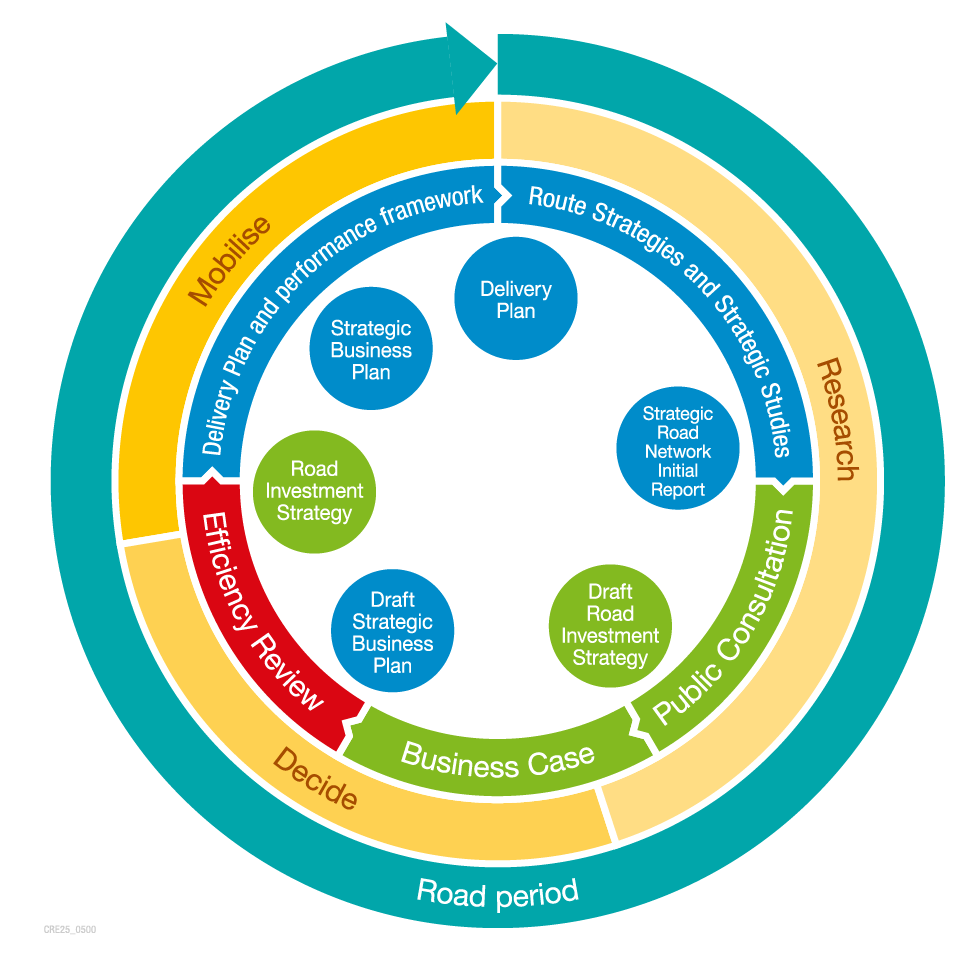How we are funded
Our core funding is set through the Road Investment Strategy (RIS) process, normally in five-year cycles called Road Investment Periods.
Road Investment Periods
For each road period, we produce a Strategic Business Plan (SBP) and Delivery Plan setting out how we will use the funding provided to meet the requirements set by the Government’s Department for Transport (DfT) through the RIS and our licence. This enables us to plan for the long term, and provide the best possible service for our customers, the taxpayer and the country.
The most recent Road Investment Period (road period 2) concluded on 31 March 2025. The start of the next five-year Road Investment Period (road period 3) has been deferred until April 2026 by the Government to align with the comprehensive spending review. For 2025-26, we have therefore been awarded a one-year interim financial settlement, in accordance with statutory directions and guidance provided for under Section 6 of the Infrastructure Act 2015.
Strategic road network: Interim Settlement 2025 to 2026
Read our 2025-2026 Interim Period Delivery Plan
On 24 March 2025, the Government published the financial settlement for Investment and management of the strategic road network from April 2025 to March 2026. As required under the statutory directions and guidance, our plans for using this funding are set out in our 2025-2026 Interim Period Delivery Plan (IPDP).
Read the Interim Period Delivery Plan
Road Investment Period 2 - 2020 to 2025
From 2020 to 2025, we invested £23 billion in the Strategic Road Network despite challenges such as planning delays, the Covid-19 pandemic and increases in inflation.
We are proud of what we delivered during the road period 2 including:
How to read this dashboard (methods, baselines & notes)
- Reductions are measured vs stated baselines (e.g. KSI vs 2005–09 average, casualties since 2019).
- “>” indicates a minimum; exact totals vary by year or scheme completion.
- All metrics are repeated in text; icons are decorative only.
There are a small number of areas where we have significantly improved our performance but narrowly missed our five year target, and a handful that have been subject to significant external influences beyond our control, such as average delay across our network. We are focusing on learning lessons from road period 2 and are reflecting on those as we continue developing our plans for road period 3 and beyond.
More detail can be found in our published Annual Report and Accounts 2024-2025 and Performance Monitoring Statements.
Planning for future road investment periods
To prepare for each road period, we undertake extensive evidence gathering, research and engagement, working alongside the DfT. The key findings are compiled into a National Highways publication called the Strategic Road Network Initial Report (SRN IR).
The DfT leads an eight week public consultation exercise based on the SRN IR. The outcome of this consultation informs the DfT’s development and publication of the Draft RIS and the Government’s funding allocation for the next road period.
Our latest SRN IR was published and consulted on in 2023, and covers the period 2025-2030, in preparation for RIS3. To find out more and access the document,
See our latest Strategic Road Network Initial Report
RIS Cycle
A summary of the end-to-end process for developing the Road Investment Strategy, Strategic Business Plan and Delivery Plan for each road period is provided in the following diagram.

Organisations responsible:
Organisation responsible for each key activity or document
- National Highways
- Department for Transport
- Office of Rail and Road
Stages of the RIS cycle
-
Research
- Route strategies & strategic studies
Responsible: National Highways
Evidence gathering and analysis leading to the Strategic Road Network Initial Report.
- Public Consultation
Responsible: Department for Transport
DfT consults on priorities and outcomes for the next road period.
- Route strategies & strategic studies
-
Decide
- Business Case
Responsible: Department for Transport
DfT develops the full business case that sets out the RIS investment needs
- Draft Strategic Business Plan
Responsible: National Highways
NH details how it would deliver the draft RIS, including outcomes, costs and performance measures
- Efficiency Review
Responsible: Office of Rail and Road
ORR independently assesses deliverability, efficiency and performance framework.
- Road Investment Strategy (final)
Responsible: Department for Transport
DfT confirms funding, outcomes and requirements for the road period.
- Business Case
-
Mobilise
- Delivery Plan & performance framework
Responsible: National Highways
NH publishes the detailed Strategic Business Plan and Delivery Plan, including the performance framework, for the period.
- Road period — Deliver the plan
Responsible: National Highways
- Implementation, monitoring and reporting against the agreed outcomes.
- Delivery Plan & performance framework








